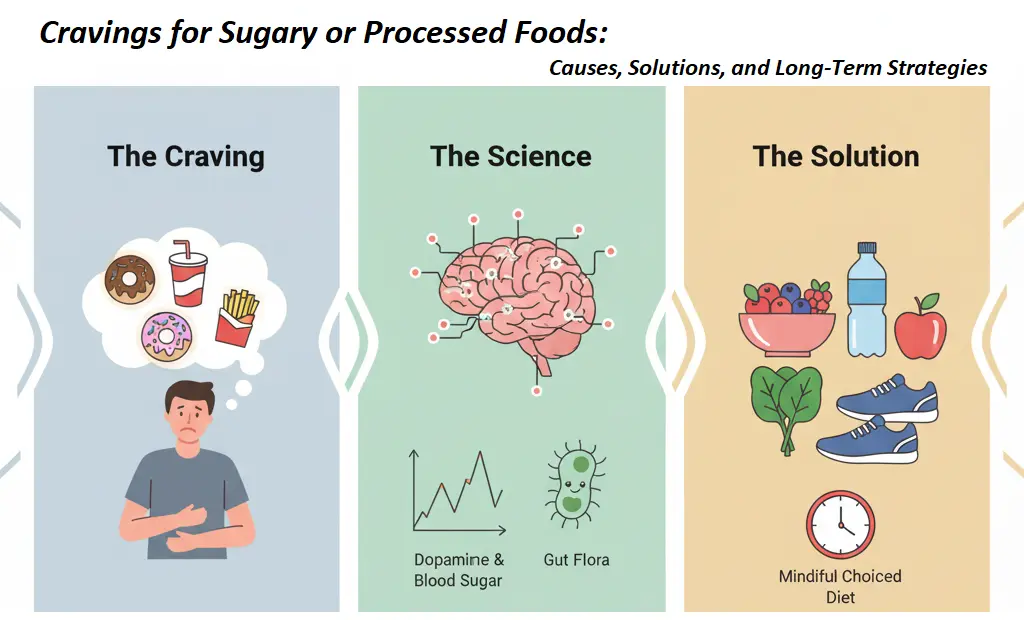If you happen to’ve ever felt an uncontrollable urge to seize a chocolate bar, end a bag of chips, or binge on quick meals, you aren’t alone. Cravings for sugary and processed meals are among the many most typical diet challenges confronted right now. Regardless of understanding these meals typically lack vitamins and contribute to well being issues, resisting them can really feel nearly unimaginable.
Cravings should not merely a matter of “weak willpower.” They’re the results of complicated interactions between your mind, hormones, intestine, and setting. By understanding these underlying mechanisms, you may take again management and develop long-term methods that assist your health, well being, and general well-being.
This text explores why we crave sugary and processed meals, the well being penalties of giving in too typically, and sensible methods to scale back cravings with out feeling disadvantaged.
Why Do We Crave Sugary and Processed Meals?
Cravings should not random—they’re rooted in biology and psychology. Listed below are the commonest drivers:
1. Blood Sugar Swings
Sugary and refined meals are shortly damaged down into glucose, inflicting a spike in blood sugar. In response, insulin is launched to deliver ranges again down. This speedy rise and fall creates an power rollercoaster, resulting in fatigue, irritability, and renewed cravings.
Instance: Consuming pastries for breakfast can depart you craving one other sugar hit by mid-morning, as a result of your physique is in search of fast power once more.
2. The Mind’s Reward System
Sugar and extremely processed meals activate the mind’s reward middle, releasing dopamine. This feel-good chemical reinforces the habits, making you wish to repeat it. Over time, the mind begins to affiliate stress, boredom, or fatigue with the necessity for sugary snacks.
Analysis even compares this cycle to addictive patterns seen in substance use problems.
3. Hormonal Influences
- Ghrelin (the starvation hormone) rises earlier than meals and will increase urge for food. Sleep deprivation or weight-reduction plan can increase ghrelin, intensifying cravings.
- Leptin (the satiety hormone) alerts fullness, however excessive sugar and processed meals consumption can blunt leptin sensitivity, making you are feeling much less glad.
- Cortisol (the stress hormone) triggers cravings for high-energy, consolation meals as a part of the physique’s survival mechanism.
4. Intestine Microbiome Alerts
Rising analysis suggests intestine micro organism could play a job in cravings. Sure microbes thrive on sugar and processed meals, they usually can ship alerts by way of the gut-brain axis to encourage you to eat extra of what they want.
5. Emotional and Environmental Triggers
- Stress, boredom, loneliness, or reward-seeking typically result in emotional consuming.
- Social gatherings, advertising, and promoting prime us to affiliate happiness with processed snacks.
- Easy availability—maintaining cookies at dwelling or passing a bakery day by day—can set off cravings with out starvation.
The Well being Penalties of Uncontrolled Cravings
Occasional indulgence is regular, however frequent reliance on sugary and processed meals can result in severe well being dangers:
- Weight Achieve and Weight problems: Processed meals are calorie-dense however nutrient-poor, making it simple to overconsume with out feeling glad.
- Metabolic Problems: Frequent spikes in blood sugar and insulin contribute to insulin resistance, prediabetes, and sort 2 diabetes.
- Poor Intestine Well being: Diets excessive in refined carbs and components disrupt intestine microbiota range, weakening digestion and immunity.
- Lowered Cognitive and Bodily Efficiency: Sugar highs and crashes have an effect on focus, temper, and train endurance. Lengthy-term consumption has additionally been linked to reminiscence decline.
- Elevated Threat of Continual Illnesses: Extra sugar consumption raises the chance of heart problems, liver illness, and even some cancers.
Sensible Methods to Cut back Cravings
Cravings can’t be eradicated fully, however they are often managed successfully with the proper strategy.
1. Stabilize Blood Sugar with Balanced Meals
- Embrace protein and wholesome fat (eggs, hen, nuts, olive oil).
- Add fiber-rich meals (greens, legumes, complete grains).
- Keep away from skipping meals—going lengthy hours with out consuming intensifies cravings.
2. Keep Hydrated
Gentle dehydration typically mimics starvation. Ingesting water, natural tea, or glowing water can scale back cravings, particularly within the afternoon when power dips.
3. Change, Don’t Get rid of
Utterly slicing sugar could really feel restrictive and backfire. As an alternative, swap processed snacks with more healthy alternate options:
- Sweet → fruit with nut butter
- Ice cream → Greek yogurt with berries
- Chips → air-popped popcorn with spices
- Soda → glowing water with lemon
4. Plan Forward for Craving Hotspots
If evenings or hectic workdays set off cravings, put together snacks upfront. Having more healthy decisions available reduces reliance on ultra-processed choices.
5. Prioritize Sleep
Lack of sleep will increase starvation hormones and reduces impulse management. Persistently sleeping 7–9 hours improves urge for food regulation and reduces cravings.
6. Handle Stress Proactively
Since stress fuels cravings, adopting stress-management methods is essential:
- Train repeatedly (a pure dopamine booster)
- Observe mindfulness or meditation
- Journal to course of feelings as a substitute of turning to meals
7. Observe Conscious Consuming
Consuming slowly, being attentive to flavors, and recognizing true starvation versus emotional starvation can scale back impulsive consuming.
8. Gradual Discount Technique
For heavy sugar customers, scale back consumption step-by-step:
- Week 1: Lower one sugary drink per day.
- Week 2: Change dessert 3 days per week with fruit.
- Week 3: Cut back hidden sugars (ketchup, sauces, flavored yogurts).
This sluggish strategy permits your style buds and mind reward techniques to regulate.
The best way to Incorporate Into Your Routine
Novices
- Change one sugary snack per day with a whole-food different.
- Maintain a cravings journal to determine emotional or situational triggers.
Hypertrophy Coaching
- Use slow-digesting carbs (oats, brown rice, quinoa) to gas workouts and restrict power crashes.
- Time carb consumption round exercises to fulfill cravings whereas optimizing efficiency.
Power & Efficiency Athletes
- Deal with nutrient-dense carb sources to take care of glycogen shops.
- Keep away from excessive sugar consumption earlier than coaching—it may well trigger a crash mid-session.
Basic Health & Well being
- Goal for an 80/20 steadiness: 80% complete meals, 20% versatile decisions.
- Use portion management methods reasonably than complete restriction.
Circuit Coaching or Excessive-Power Exercises
- Plan snacks like bananas with peanut butter to stop post-workout sugar binges.
Mobility and Restoration
- Anti-inflammatory meals (berries, leafy greens, fatty fish) not solely help restoration but additionally scale back inflammation-driven cravings.
Continuously Requested Questions
1. Why do I crave sugar extra at evening?
Blood sugar dips, fatigue, and diminished willpower on the finish of the day typically mix to accentuate cravings at evening.
2. Are sugar cravings an indication of deficiency?
Generally. Magnesium or chromium deficiencies could improve candy cravings, although typically it’s attributable to power fluctuations or behavior.
3. How lengthy does it take to interrupt the craving cycle?
Most individuals discover diminished cravings in 2–4 weeks after slicing again, because the mind’s reward system recalibrates.
4. Is fruit unhealthy if I’m making an attempt to keep away from sugar?
No. Fruit accommodates pure sugars balanced with fiber, nutritional vitamins, and antioxidants. It’s a more healthy technique to fulfill candy cravings.
5. Do synthetic sweeteners assist?
They could scale back calorie consumption quick time period however may also preserve a choice for candy style. Moderation is vital.
Conclusion
Cravings for sugary and processed meals should not a weak point—they’re a organic response formed by hormones, mind chemistry, and setting. Whereas occasional indulgence is regular, counting on these meals constantly can hurt your well being, power, and health progress.
By stabilizing blood sugar, managing stress, getting satisfactory sleep, and training conscious consuming, you may considerably scale back cravings and make more healthy decisions really feel pure over time.
Taking management of cravings will not be about strict restriction, however about constructing habits that nourish your physique whereas nonetheless permitting flexibility. Over weeks and months, your style buds, intestine well being, and mind reward pathways will regulate—making complete, nutrient-dense meals way more satisfying than processed alternate options.
References
- Benton, D. (2010). The affect of dietary standing on the cognitive efficiency of kids. Molecular Diet & Meals Analysis.
- Volkow, N. D., & Wise, R. A. (2005). How can drug habit assist us perceive weight problems? Nature Neuroscience.
- Chaput, J. P. et al. (2016). Sleep patterns, food plan high quality and power steadiness. Physiology & Habits.
- Hall, K. D. et al. (2019). Extremely-processed diets trigger extra calorie consumption and weight acquire. Cell Metabolism.
- Micha, R., et al. (2017). Affiliation between dietary components and mortality from coronary heart illness, stroke, and sort 2 diabetes. JAMA.

